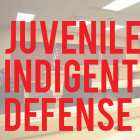
Youth Facing Adult Jail Time now Excels in Alternative Program
|
Although Daryl was only 15 years old at the time of his arrest, he was charged and tried as an adult.
Juvenile Justice Information Exchange (https://jjie.org/series/juvenile-indigent-defense/)
“Due process is the primary and indispensable foundation of individual freedom,” Supreme Court Justice Abe Fortas wrote in the majority opinion of the Court’s landmark 1967 juvenile justice decision, In re Gault — a decision that established that under the Constitution, juveniles in delinquency proceedings are guaranteed many of the same due process rights as adults in criminal trials
But today, nearly a half-century after the Gault case began, due process rights remain elusive for thousands of juvenile defendants facing felony charges that could lead to years of incarceration. Attempting to fill the void when possible are the often over-worked juvenile public defenders. But in many jurisdictions, juveniles are not even appointed a defense attorney until after their first hearing — a hearing in which a judge will decide if the youth will be held in detention or released.
In a continuing series, JJIE will explore the complicated world of juvenile defense — from the difficult job of the juvenile public defender to the jumble of juvenile court systems across the country whose processes ensure many kids never receive representation. At the heart of it all are kids whose lives are indelibly altered by the process of navigating the juvenile court system, with or without legal representation.

Although Daryl was only 15 years old at the time of his arrest, he was charged and tried as an adult.

As a Public defender with the Legal Aid Society’s Adolescent Intervention and Diversion Project, Donna Henken works with 13- to 15-year-olds charged with felony crimes. These adolescents are known as juvenile offenders and they are tried in adult criminal court rather than family court. Henken’s clients struggle with the same issues as juveniles in the family court system. According to the Legal Aid Society, about 20 percent of these youth have experience with the foster care system. Almost two-thirds have special-education needs and about 25 percent of them have significant mental health issues that require ongoing care.

In just one day spent in the juvenile court, orders of protection are issued, as well as plenty of warrants for defendants who fail to show up.

Public defender Drayton refuses to view his young indigent clients as “the problem” -- rather, he believes their actions are symptomatic of a much larger issue within many U.S. communities.

To provide insight into the shadowy world of juvenile public defense, JJIE spent a day trailing juvenile public defender Pinkney at the Alameda County Juvenile Justice Center, atop a hill in this city in the East Bay, just south of Oakland.
A single phone call made from a trailer home in rural Arizona, where 15-year-old Gerald “Jerry” Gault lived with his family, wound up indelibly altering the landscape of juvenile justice in America.

In a continuing series beginning today, JJIE will explore the complicated world of juvenile defense -- from the difficult job of the juvenile public defender to the jumble of juvenile court systems across the country.